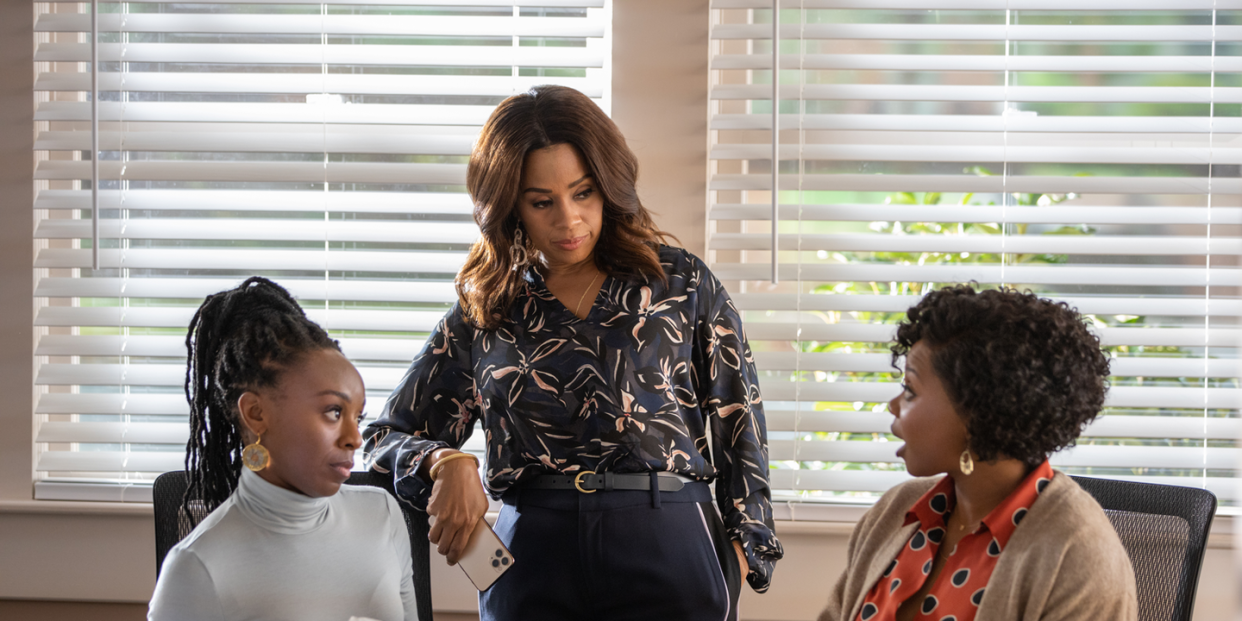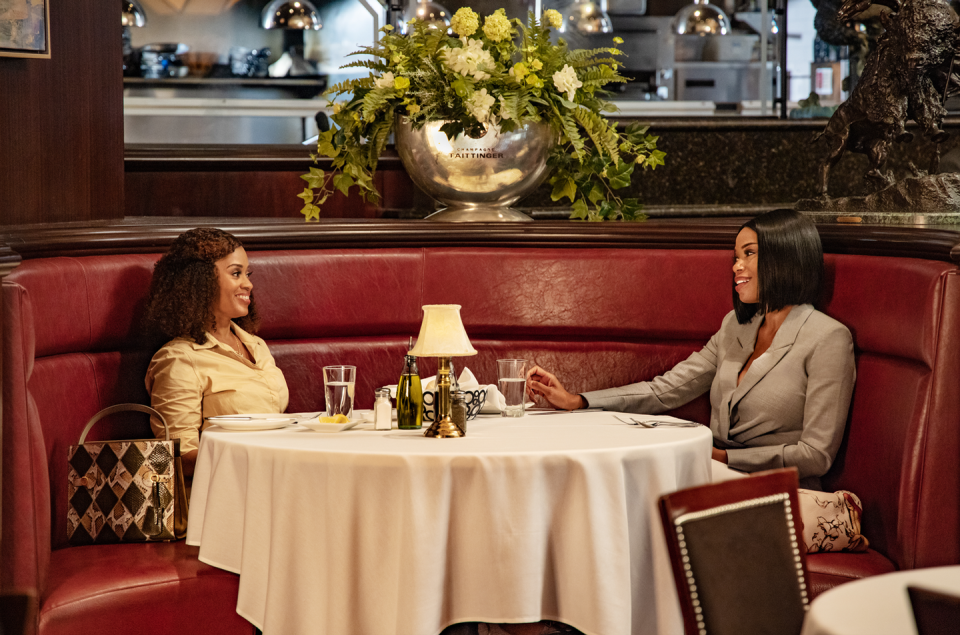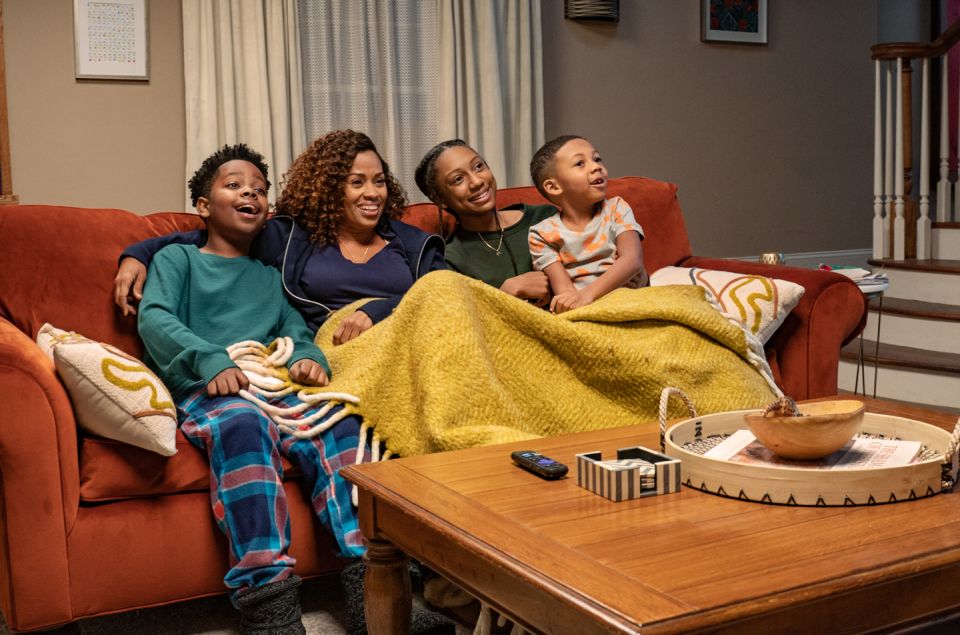OWN’s New Show "Delilah" Speaks to the Burdens Black Women Bear

- Oops!Something went wrong.Please try again later.
After finishing the first episode of Delilah, a new OWN drama that premiered March 9, I immediately texted a good friend and told her she had to add the show to her watchlist. The titular character reminded me so much of her: Really good at her job, tough enough to handle life’s challenges, but secretly mush inside. Delilah even reminded me of my friend physically; it was exciting to see a character I recognized as someone important to me, especially since I haven’t been with her in almost seven months.
Of course, I’ve seen television characters before who reminded me of my family and friends, but recognizing Delilah’s strength and complexities after a year of so much distance between loved ones was a moving experience—and it didn’t hurt that the show itself was so rich and fulfilling.
Written by Greenleaf’s Craig Wright, Delilah stars Maahra Hill as Delilah Connolly, a lawyer who owns her own firm in Charlotte, North Carolina and is a divorced mother of two. Early on, Delilah finds herself in quite a tangle. More than one, actually. She’s raising her adorable young nephew (Khalil Johnson) while her brother adjusts to civilian life after he's paralyzed while serving in the military, and her sister-in-law tries to figure out her own life. Despite a full plate, Delilah agrees to take on a case when an old college acquaintance, Leah (Saycon Sengbloh), thinks something strange might be going on at her government job. To complicate matters even further, Tamara Grayson (Jill Marie Jones), Delilah’s best friend who works at the city’s biggest law firm, is being pushed to work on the case from the other side, potentially pitting the two against each other.
So in the midst of raising three children, Delilah is trying to straighten out her brother’s future medical needs, convince her ex-husband to handle his responsibilities better, keep her law firm afloat, tackle an increasingly complicated case, and deal with the strain on her most valued friendship. Delilah is carrying a back-breaking amount of burdens—but if you’re a Black woman watching the series, none of them seem outlandish or unrealistic.
In my experience, it’s an unfortunate truth that many of us have to bear an excessive amount of pressure in order to keep our loved ones safe and their worlds moving forward. And ensuring Delilah’s life reflected those burdens without over-dramatizing them, even for the sake of television, was very important to Wright, the series's creator. “We wanted to make a show that was more of a reflection back at OWN’s audience, about the best of who they were,” Wright tells Oprah Daily.
As Wright worked on Greenleaf, an OWN show about a family that owned a Memphis megachurch with predominantly Black members, and received feedback from the cast, crew, and its audience, he realized that Black women “were holding together their families,” he says. “They were holding together their friendships. They were holding together their workplaces. They were holding together the government in the sense of managing to get people out to vote. They were holding all these different parts of the world together, but then no one felt that anyone saw that they were doing all of it.”
These conversations about the many roles Black women play ultimately inspired Wright to create Delilah, and attracted Maahra Hill to the lead character. “The role felt true to me, about who we are,” Hill says. “It was important to tell the truth about who we are on a regular basis and how many balls we juggle—the load that we carry as African American women, in particular.”
Yet for all of Delilah’s resilience and fortitude, Delilah is not a show dedicated to perpetuating a “strong Black woman” stereotype, the common depiction of Black women as tough, self-sacrificing tropes with little emotional depth. Yes, Delilah overextends herself because she wants to be an advocate for those around her—but she also needs moments for calming breaths and quick cries before she returns to the task at hand. The show allows for a gentler depiction of strength: Her quick breaks are subtle reminders that we have to take time for ourselves, even in the midst of helping others.
Hill has always been careful about the roles she accepts because she wants to be careful about how she portrays Black women on screen. Hill drew on her own life experience as a mother who prioritized her child over a career, but still wanted to fight for what’s right. Hill is a court-appointed special advocate for children, who studied political science, and thought about a career in law, before turning to acting. “I believe in Delilah’s fight for the underdog and how much justice and truth mattered to her, how much she gives herself to everyone in her world without giving enough to herself. I know all those things very well," Hill shares.
When creating Delilah, both Wright and executive producer Charles Randolph-Wright knew they wanted to avoid overused archetypes. “So often, characters of color are myopic—in one direction, in one box. And what I love about all of these characters is that they're a roller coaster of emotions and energy,” Randolph-Wright says. Wright feels similarly: “I despise tropes because they perpetuate passivity and coddle people into watching things passively, instead of watching things with an eye for how to improve their own lives.”
The result of their efforts is a series in which characters are simultaneously unique and familiar—not thanks to stereotypes, but because of good writing. Watching Delilah, I could not get over how real everyone felt. I recognized someone I knew in almost every character. Miss Virginia (Karen Abercrombie), the violin instructor for Delilah’s daughter, made me think of my professors and mentors in college who wanted to make sure we were proud of our talents. Nate (Leonard Harmon), Delilah’s younger brother, reminded me of cousins and family friends who struggled to figure out their lives after something unexpected changed their plans.
One of the ways Wright and Randolph-Wright built such relatable characters was reaching out to the actors themselves to get input. Jill Marie Jones calls Delilah the “most collaborative experience” she’s ever had as an artist. “Sometimes Craig Wright might give you a phone call or he might email and ask you, ‘What do you think Tamara would say right here?’” she explains.
Delilah’s authenticity in portraying Black life extends to a macro scale. We frequently hear that Black people are not a monolith, but we don’t get to see the adage played out on screen as often as we should. Delilah, on the other hand, shows “all different textures of Blackness,” as director Cheryl Dunye puts it. Iconic sitcoms like A Different World, Living Single, and Girlfriends plus dramas like Being Mary Jane, OWN’s Greenleaf and Queen Sugar all cleared a path for the medley of Black experiences we see in Delilah.

Delilah shows how the diaspora is represented in a major southern American city. Demetria Barnes (Susan Heyward), an associate Delilah hires, has Afro-Cuban heritage; Delilah’s assistant Harper Omereoha (Ozioma Akagha) has Nigerian parents; and Jamal (Michel Curiel), a potential love interest for Delilah, is Dominican. It was refreshing to see diversity within the show’s Black characters—because that is a true reflection of the world.
Just as true is the portrayal of friendship between Delilah and Tamara, arguably the backbone of the series. From afar, the law school friends lead different lives: Delilah is a single mom with a small practice; Tamara is a corporate lawyer who lives in a high-rise and is dating the dashing deputy mayor. Hill describes Delilah as “purpose-built, heartfelt, and committed.” Tamara, in Jones’s words, is “a fierce and dynamic woman, but also warm and gooey.” For all their differences, or because of them, Delilah and Tamara complement each other. They’re friends who love each other in a transparent and easy way—so when this case builds a wall between them, it presents a particularly wrenching challenge.

Jones appreciates the relationship between Delilah and Tamara because she recognizes the importance of that bond in her own relationships. “I have friendships all across the rainbow, but there's just something that's really textured with my friendships with my sisters,” she says. “I will say that it's almost like you don't have to explain all the time. You know what I mean? It's like we have a communication that's just because we come from the same place and it's important.”
Hill is equally enamored with the portrayal of Delilah and Tamara as friends who are good to each other and supportive, despite the unusual circumstances threatening their friendship. “I think a lot of times women are pitted against each other in a way that doesn't express that kind of emotional connection, and a sisterhood in the Black community is strong,” Hill said. “We like to get together and laugh and support one another, and motivate each other, and empower each other. So, it's important that we show the truth of that, and hold that up in high regard.”
Delilah and Tamara’s natural candor is thanks, in part, to Jones and Hills’ budding friendship off-screen. The series was filmed under strict CDC protocol in the fall of 2020. Both struggled to be away from loved ones during the pandemic, and found themselves talking on the phone for hours. It’s possible the actors took comfort in the show, however, which is set after the events of this past year are already behind us. The pandemic is only mentioned in off-handed comments like Delilah saying, “With everything that's happened in the past year.”

As a result, there is hope in Delilah’s brand of normalcy. Delilah has to take care of other people, but at least she’s with them. And with any luck, when the second season arrives, I’ll be able to watch the show with the friends that it reminds me of. On screen, we’ll see examples of how to push through difficulties as we take care of each other—and ourselves.
For more ways to live your best life plus all things Oprah, sign up for our newsletter!
You Might Also Like

